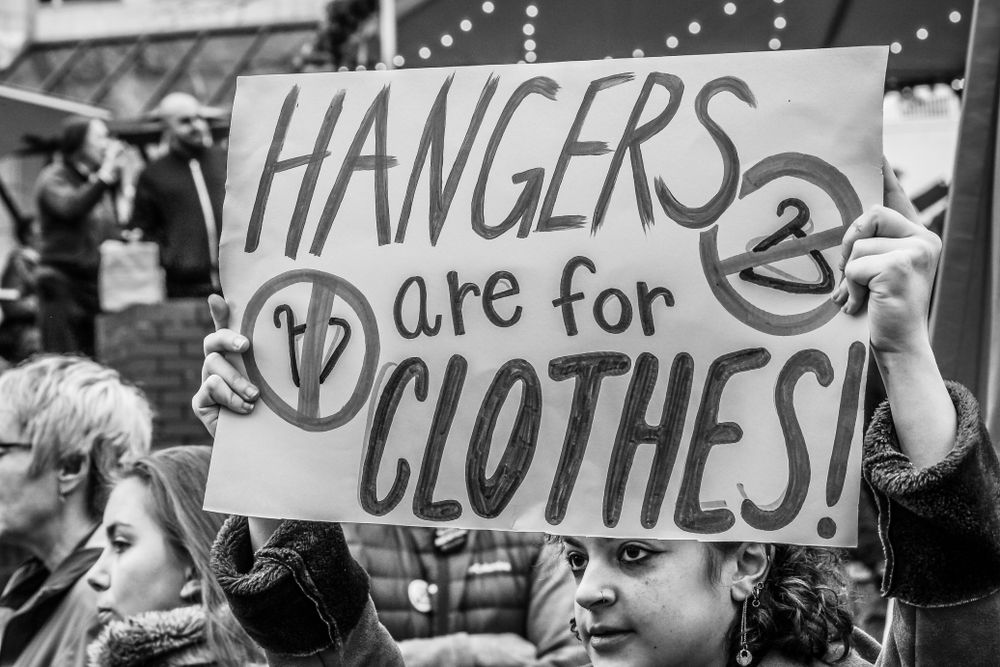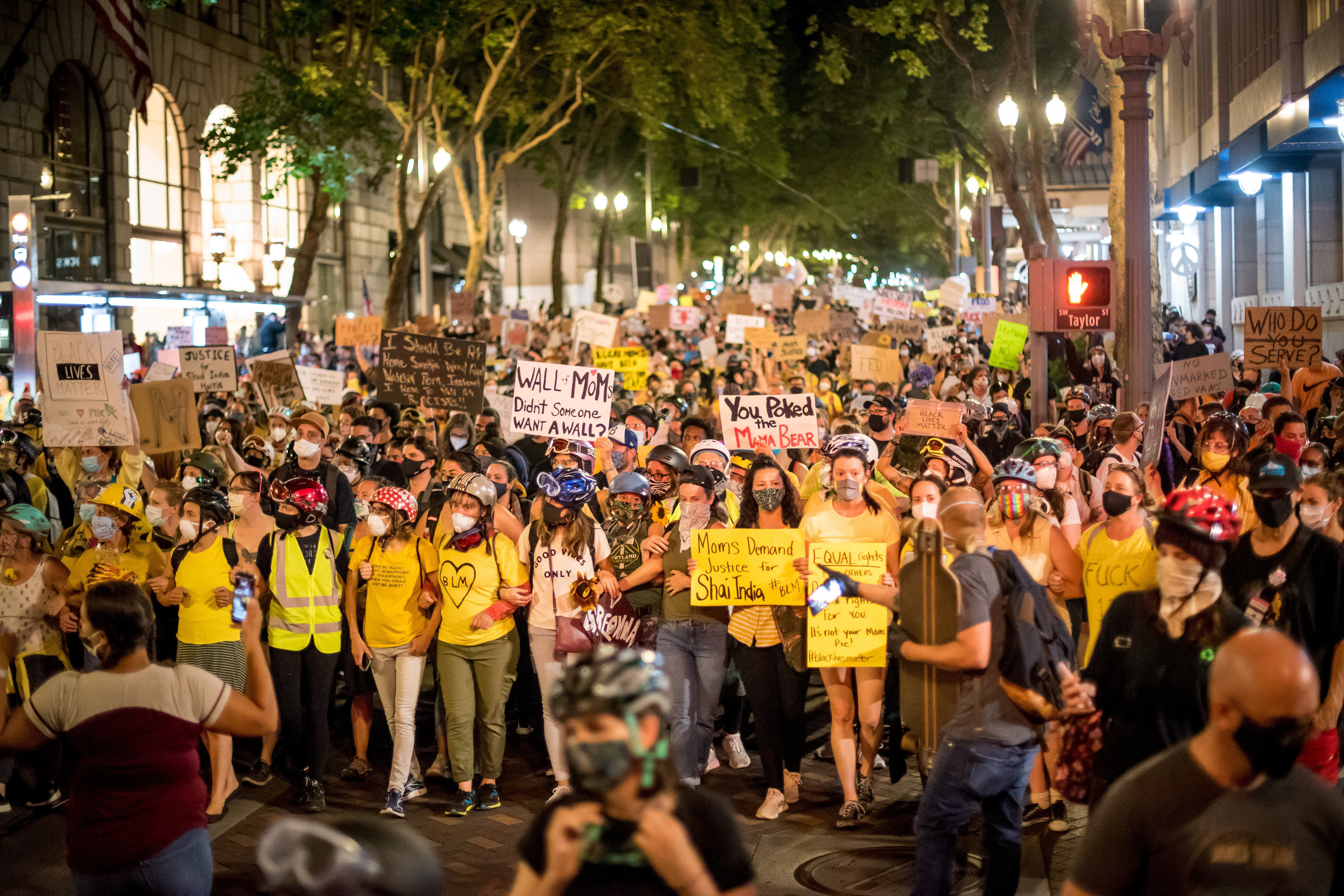Local Activists Are Planning an Abortion Rights March in Portland

Fighting for reproductive rights during a 2019 rally in Pioneer Courthouse Square.
Image: Laura Kneedler/Shutterstock
The Supreme Court’s decision to allow a Texas rule prohibiting almost all abortions after six weeks reverberated immediately in Portland, both in public indignation (see: the Portland City Council’s now-reversed call to divest from the Lone Star State and subsequent $200,000 donation to reproductive health programs) and in a furious and intentional round of private organizing.
Behind the scenes, a diverse group of Portland activists have been working on plans for a reproductive rights march on October 2, one of dozens planned across the nation.
It’s a delicate operation, magnified both because it’s centered on access to abortion, one of the most charged and emotional topics in American politics, and because planning a mass gathering during a pandemic—even an all-outdoors one—can be a minefield.
In addition, organizers are planning a march in a local landscape that’s had a reckoning in recent years, reaching all the way back to the Portland Women’s March after the 2016 presidential election, which had an eleventh-hour leadership change after accusations of racial, religious, and class exclusion were levied against its original organizers.
More recently, protests in support of Black Lives Matter drew thousands of people to march in downtown Portland in the summer of 2020, including the “Wall of Moms” group which self-immolated amidst allegations that its leadership was trying to profit off the group’s status as an overnight media sensation, without regard for Black members and their safety.
With that in mind, the Portland event’s steering committee is taking a pointedly intersectional stance from the jump.
“This country has always laid claim to who has reproductive rights, and how they are allowed to exercise those rights,” says organizer India (Winds) Wynne, who identifies as a queer, non-binary, Taino, Two-Spirit disabled veteran. “Reproductive rights are under attack, and this war knows no race, ethnicity, gender, sexual orientation, religion or class. And so I march, and I’ll keep on marching. For those raging this war against reproductive rights, I say bring it. I’m a Marine—marching is what we do!"
“As a Black woman, reproductive justice and freedom carries a particular weight,” adds Rashelle Chase Miller, a Black mother, activist and anti-racist educator who is one of the founders of mutual aid group MxM Bloc. “The freedom to autonomy over body and family has been a centuries long struggle for Black women, one that continues to this day. Generations after my great grandmother died having an illegal abortion, I had access to safe and legal abortion. It's essential that my daughter and her granddaughters have access to the same choice I had, and that my grandmother was denied."
Organizers of the October 2 march, which will kick off at 11 a.m. from Revolution Hall and feature a slate of speakers, including abortion rights pioneer Judith Arcana, are also acutely aware that extreme right-wing groups keep close tabs on events like theirs, and have gotten even more brazen in just the last two years about counter-protests that can quickly turn violent. As a result, the location of the reproductive rights march is being kept under wraps for now, though organizers say it will be revealed within a week of the march.
Here’s what we do know about the event so far:
- The march is being overseen by a group of eight, charged with shaping the overall vision, goals and programming of the event. Besides Winds and Chase, they include Jaime Cale, a Black and Indigenous mother and activist who is also a co-founder of MxM Bloc, Jenn Thompson, a Hong Kongnese activist and abolitionist, Megan Cohen, a practicing OB-GYN in Portland, Princess Unicorn (legal name), a mother and activist, Katie Jahangiri, a former Texan and mother, and Simona Bearcub, a queer Afro-Indigenous land and water protector/defender and member of the Fort Peck, Assiniboine, and Sioux tribes.
- Marchers will be asked to wear masks, to comply with COVID-19 safety protocols. The goal is also to make the event fully accessible, including a flat route, ASL interpreters, and seating up front for those who need it.
- Organizers are focusing all their efforts on the October 2 event, and won’t seek to raise funds. Instead, they are directing those interested in donating funds to reproductive rights groups in Portland, in Texas, and elsewhere.
- Logistics and information are being released through an invite-only Facebook group that’s already attracted 2,000 members.
“This march is important to me for a multitude of reasons,” Thompson says. “But the biggest motivation for me is being a part of a team where the majority of members are folks of color who believe that intersectionality within reproductive rights needs to be prioritized. I ask that you always keep in mind that anyone can get pregnant, anyone can get their period, and anyone and everyone should be able to get an abortion."
For more information, and to keep up with plans, follow them on Instagram at @pdxforreproductiverights




